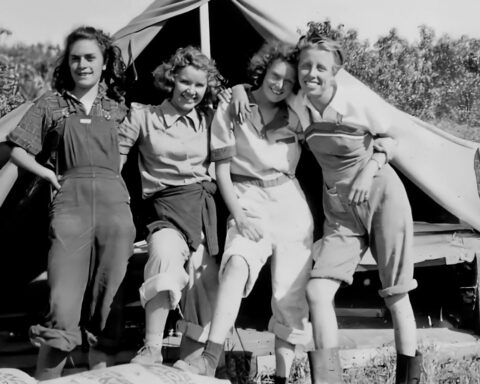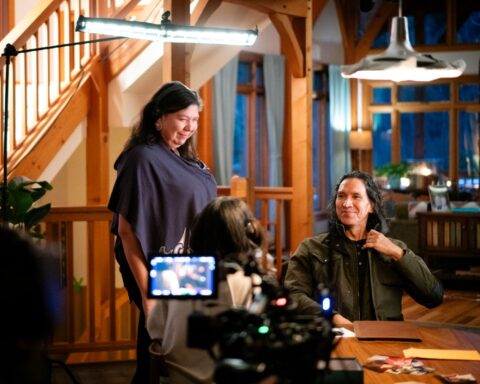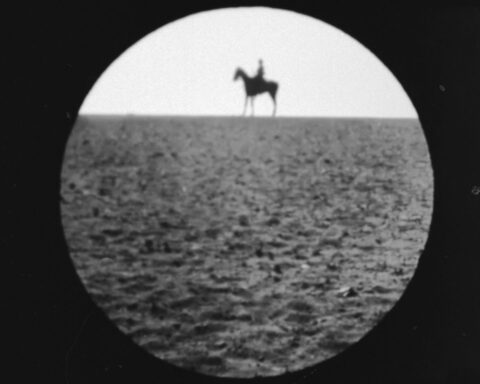In the Name of All Canadians
(Canada, 75 min.)
Dir. Vivian Belik, Karen Chapman, Aisha Jamal, Khoa Lê, Annick Marion, Ariel Nasr, Patrick Reed, Andréa Schmidt, Jérémie Wookey
Earlier this year, TIFF artistic director Cameron Bailey posed a fair challenge to Canadian filmmakers. In a Globe & Mail piece titled ‘Dear Canadian filmmakers: it’s not about you, it’s about us’, Bailey wrote, “What if we stopped pretending that Canada is safe, nice and boring enough to leave off the big screen, while we focus on personal fictions? Instead, we could rip the lid off and reveal very Canadian acts of deceit, murder, betrayal and corruption that happen every day across this great country.” Bailey’s query largely points towards fiction filmmakers in Canada, noting, “Our documentaries tackle climate change, indigenous rights, urban poverty and other pressing, current social issues.”
Nonetheless, documentary ups the ante in a new original production from Toronto’s other big festival, Hot Docs, that directly tackles the corruption and prejudice that shape the nation from coast to coast. In the Name of All Canadians is the major Canada 150 project from Hot Docs and this inclusive anthology film addresses the concerns that Bailey identifies as rarely being considered in stories about nice, snowy, ho-hum Canada. The film is one of the few logical Canada 150 initiatives for assessing the nation in a productive way.
The six vignettes offer personal narratives about Canadians who struggle to enjoy the rights and liberties promised to all citizens of this nation in the Charter of Rights and Freedoms. These six short docs, each made by a unique filmmaker or filmmaking team, focus on stories of oppression and alienation that exist for cultural minorities in Canada. The accounts are all troublesome for their immediacy and each film emphasizes the strength and resilience of their subjects.
L’inspecteur, directed by Jérémie Wookey and Annick Marion, intertwines the stories of three Franco-Manitobans with animated sequences in many languages. The three elderly women reflect on their experiences as young students and teachers in Manitoba’s education system only a few decades ago. They recall all their classes being taught in English to assimilate the Francophones through the suppression of their language. The teacher gives vivid memories about the school board’s dismissive language inspector invading the classrooms to detect renegade traces of French. The stories of quiet rebellion, like the memory of a student keeping a lookout to alert the teacher of the inspector’s arrival or that of a young girl responding to the language inspector’s question “What is a beach?” with the innocent reply, “A female dog,” offer words of humour, courage, and hope. This retrospective account illustrates the necessity of protecting education in all official languages to preserve distinct cultures and provide common ground.
New Canadians find their voice in Aisha Jamal and Ariel Nasr’s The Long Way Home, which chronicles the plight of Abousfian Abdelrazik after his 2003 arrest and detention in the Sudan at the behest of the Canadian government. This chilling account of the Sudanese-Canadian’s six-year fight to return home, as well as the efforts of activists fighting in Canada for his release, offers a damning account of contemporary Canadian politics that has seen increased infringements on the rights of new Canadians. This documentary confronts with pointed passion the question of how a country driven by immigration can backslide into making a Charter of Rights and Freedom’s appeal an act that applies to only select citizens in an era of increased Islamophobia and xenophobia. Particularly as Canada 150 coincides with the peak of conservative chaos south of the border, Jamal and Nasr’s fierce and challenging interrogation of inequality at home is a necessary piece to consider.
Race figures prominently in two other docs, Lessons Injustice directed by Karen Chapman and Nothwithstanding by Patrick Reed and Andrea Schmidt. These two films take very different approaches to concerns of exclusion, racial profiling, and prejudice. Lessons Injustice offers a fleeting verité-style drive around Toronto as lawyer Danardo Jones explains to his son his experience growing up in the face of anti-Black racism that, unfortunately, continues as the next generation comes of age. One senses Jones’s frustration as the film cuts methodically between shots of the driver and scenes of urban streets, Chapman pulls the story together with an air of timelessness that haunts. Notwithstanding, on the other hand, offers a work of “speculative documentary” that considers a very possible reality in which the controversial Notwithstanding Clause could be invoked if the nation finds itself swept up in the right-wing wave of politics rippling across the globe. (The clause allows Parliament or provincial legislatures to override portions of the Charter.) Several Arab-Canadians discuss cases in which they experienced Islamophobia firsthand, like a woman who had a court case tossed out because she refused to remove her hijab in court and a teenager who tells a chilling story of living in a remote camp for refugees. These stories, like Jones’s case, Abdelrazik’s saga, and the history of Franco-Manitobans, offer essential acts of resistance that make the country stronger by challenging violations of fundamental rights we assume all Canadians enjoy.
Last Resort, arguably the standout film of the anthology, comes from Vivian Belik and injects another timely court case to the narrative. This short film echoes the concerns of #Resistance150 and other Indigenous responses to Canada 150 that defy the notion that a nation began on this territory in 1867. (As we know, the history of inhabitants on the land called Canada stretches back much further in time.) The film features a landmark case in which the people of the Ktunaxa Nation bring to court a challenge against the appropriation of their sacred land for a proposed ski resort. The film has echoes of Alanis Obomsawin’s Kanehsatake as it depicts the white majority’s utter failure to be sensitive to the rights, traditions, and histories of the Indigenous inhabitants of the land. As Last Resort shows the first case in which an Indigenous land claim case stands on grounds of religious belief, the litigation asks us to protect Indigenous beliefs and culture with the same care to which rights extend for all non-Indigenous Canadians. Belik’s film tackles a central problem (if not the central problem) to the Canadian ethos, which is the settler mentality that struggles to adapt to the needs, rights, and land claims of the original inhabitants of the land. Strikingly shot landscapes evoke the power and beauty of the territory that the Ktunaxa strive to protect, while the characters give the film an intimate yet epic scope that puts Canada’s ongoing insensitivity to Indigenous communities on trial.
In the Name of All Canadians connects these short films with segments of a sixth doc, In Part, directed by Khoa Lê. These fragments offer interviews with Canadians from all backgrounds: Francophone, Anglophone, Black, white, Asian, Indigenous, young, old, straight, gay, transgender, etc. (The latter gets a strong presence from Those Who Make Revolution Halfway Only Dig Their Own Graves star Gabrielle Tremblay.) The interviewees answer a series of questions, which offer a range of responses that reflect the complexity of the nation and the lack of a singular Canadian identity. Cut across the other stories, the puzzle pieces of this film come together to create a mosaic: a nation of distinct parts that make a whole.
In the Name of All Canadians does away with the navel-gazing, backslapping, and self-congratulation of Canada 150 to force the next part of the national conversation. A century and a half is a major birthday and the milestone invites collective self-reflection.
In the Name of All Canadians premieres at the Hot Docs Ted Rogers Cinema on Wednesday, June 28 with a theatrical run beginning June 30.









